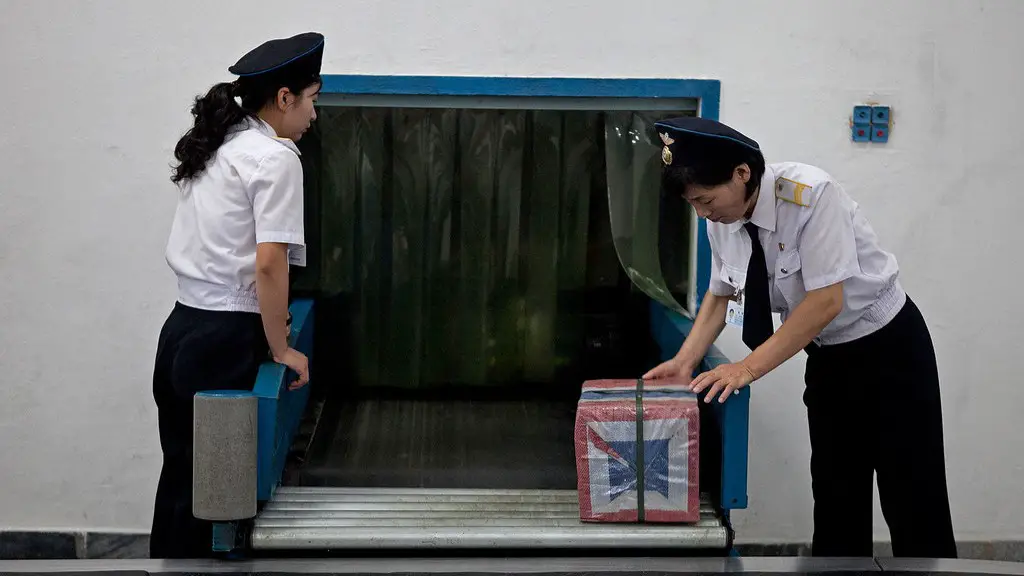What North Korea Is Targeting
North Korea is arguably one of the most unpredictable and dangerous countries in the world. It is estimated that the North Korean regime is spending approximately 40% of its national budget on defense, which raises the question: where is North Korea targeting its spending?
The world has grown increasingly aware of the nation’s hostile actions and policies, focused around the pursuit of nuclear weapons and the relentless intimidation and provocation of other nations. Considering its spending on defense, it is clear that North Korea’s military capabilities are the major priority of its leadership.
The country is currently believed to maintain an active arsenal of six to eight nuclear warheads, as well as its stockpile of various ballistic missiles. It is speculated that their missile program could enable them to deploy nuclear warheads across the world, and potentially even reach parts of Europe or the United States.
The country’s main focus for targeting is its closest neighbors, namely South Korea and Japan. Tensions between North and South have been high for decades and have been exacerbated in recent years by North Korea’s continual testing of missiles. North Korea’s ballistic missiles have the ability to reach central Japan and parts of South Korea.
In addition to their ambitious missile program, North Korea also has an impressive cyber warfare program. Cyberspace has become an increasingly important area in military and diplomatic relations, and North Korea is no exception. It is believed that the North Korean government sponsors multiple cyber-attacks of foreign organizations and websites in order to demoralize enemies and gain economic and military advantages.
Another priority for North Korea are its own ground forces, which are estimated to include anywhere from 700,000 to 1.2 million active duty troops. North Korea is known to have some of the most elite military units in the world, and it puts a great deal of effort and resources into training and equipping its special operations forces, as well as its conventional ground forces.
It is clear that North Korea has made the pursuit of nuclear weapons and military advancement its main priority, with the majority of its defense spending focused on the development and maintenance of its nuclear programs, and its other military capabilities.
North Korea’s History of Hostile Actions
The world has become increasingly aware of the hostile actions of North Korea in recent years, particularly as the nation has continued to advance its nuclear capabilities.
In 2017, the country launched multiple intercontinental ballistic missiles, as well as other missiles that could be used to deliver nuclear weapons, enabling them to target places as far away as the United States’ West Coast. The country also conducted a series of test launches of its most advanced nuclear-capable missile, the Hwasong-12, in 2017, which caused international outcry and condemnation.
That same year, North Korea also tested a powerful nuclear bomb, their most powerful ever, which caused seismic waves that could be detected for miles. This action, and in general the country’s pursuit of nuclear armaments, has been widely condemned and has caused widespread concern in the international community.
In addition to its aggressive missile program, North Korea is also believed to have engaged in numerous cyber-attacks all over the world, targeting banks, media outlets, governments, and other nations’ infrastructure. North Korea is believed to have engaged in cyber espionage and cyber criminality with ‘increasing boldness’, and has caused significant damage with its attacks. Most notably, North Korea was found to responsible for the 2017 ‘WannaCry’ cyber attack, which caused havoc all over the world and earned North Korea an estimated $1 billion.
Overall, North Korea’s growing arsenal of weapons and its history of hostile actions have caused widespread concern in the international community.
North Korea’s Standpoint
The North Korean regime believes that its nuclear weapons program is essential to its survival and the survival of the nation.
The North Korean government has cited hostile threats from the United States and its allies as justification for its continued pursuit of nuclear weapons. The nation sees the development of nuclear armaments as a necessary ‘deterrent’ against the US and its allies, and has threatened nuclear retaliation against any nation that it believes threatens its security.
In addition, the North Korean leadership has also argued that its aggressive stance and pursuit of nuclear weapons is a necessary course of action to secure its own sovereignty. This argument has been made multiple times by the North Korean leadership, which has pointed to the US backed regime change in Iraq and Libya as a reason for its own militarized stances. The nation has cited these examples as examples of countries that were targeted by the US and suffered great losses as a result, and thus sees its own pursuit of nuclear weapons as a necessary way of defending itself against similar foreign aggression.
The International Response
The international community has widely condemned North Korea’s aggressive actions, particularly its development and testing of nuclear weapons. The United Nations Security Council has issued multiple resolutions in attempt to stop the nation’s pursuit of nuclear armaments, although these have had little effect.
The United States has been particularly active in attempting to pressure North Korea into stopping its nuclear weapons program, imposing heavy sanctions and even attempting a state-level diplomatic solution. Despite the US’s attempts, it is clear that North Korea is undeterred in its pursuit of nuclear weapons.
American allies South Korea and Japan, amongst many other countries, have also been vocal opponents of North Korea’s nuclear weapons program. In recent years, both countries have increased their defense spending in response to North Korea’s aggression, and have developed long-term strategies for dealing with a nuclear-armed North Korea.
The Long-term Impact
If North Korea is able to develop a reliable long-range nuclear missile capability, the consequences for both the region and the world at large could prove devastating.
Firstly, North Korea would be in a much stronger position to threaten its neighboring countries. The risk of nuclear war in the region could escalate quickly and could lead to untold damage and destruction, as well as a huge loss of life.
Furthermore, if North Korea is able to execute nuclear attacks on more distant countries, like the United States, then the global implications could be even more catastrophic and widespread.
In addition, the development and testing of nuclear weapons would also have a lasting impact on the environment, with the potential for radiation poisoning and long-term health effects on those in the region.
Possible Solutions
Considering the dire implications of North Korea’s nuclear program, it is necessary for the international community to find a peaceful solution.
Firstly, diplomatic efforts need to be made to emphasize the risks posed by a nuclear-armed North Korea and to reiterate the need to find a peaceful, diplomatic solution.
The international community must also continue to push for harsh economic sanctions against North Korea, in order to try and pressure their leadership into abandoning their nuclear ambitions.
At the same time, it is necessary to ensure that any diplomatic solutions that may be proposed are realistic and are conducive to the security and wellbeing of the region. Any resolution must also guarantee the safety of both North and South Koreans, and must allow for a long-term, lasting peace.
North Korea’s Strategic Relationship with China
North Korea has a long history of strategic partnership with China, from which it has gained invaluable assistance and support. North Korea is heavily reliant upon China, who is believed to provide up to 70% of the nation’s energy supplies and up to half of its food imports.
In recent years, China has also sought to persuade North Korea to end its nuclear program and integrate further into the global economy. China is one of the most powerful nations in the world and, due to its strategic relationship with North Korea, arguably has more sway with the nation than any other country.
China has been instrumental in helping broker diplomatic talks between North Korea and South Korea, as well as providing economic and humanitarian aid to the nation. China has sought to ensure that North Korea’s nuclear ambitions remain in check, and has attempted to bring North Korea into the international community.
The Reality of a Nuclear North Korea
The potential for a nuclear-armed North Korea remains a concerning reality for everyone in the region, and indeed, the world. If North Korea is able to successfully develop and deploy reliable long-range nuclear missiles, the consequences for the region and the world at large could be devastating.
It is for this reason that the international community must continue to work to find a diplomatic solution to this continued crisis, in order to prevent a potential disaster.
Nations must continue to pressure North Korea to end its nuclear program, and must try to focus on providing economic aid and relief to the nation as well. Further strategic efforts must also be made to engage China in the solution, as they have the potential to be influential in pressuring North Korea to bring an end to its nuclear program.


